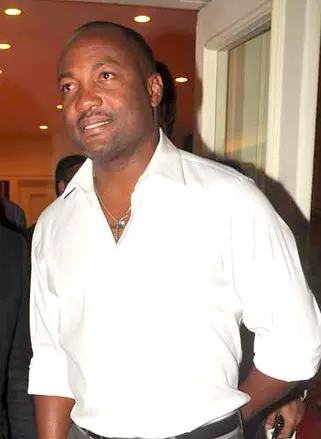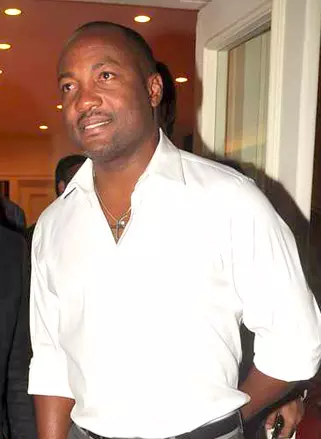
Brian Lara, also known as the ‘Prince of Trinidad’ and the ‘Prince of Port of Spain,’ is a legendary West Indian cricketer. The left-handed batsman rose to prominence as a result of his big knocks, and he holds numerous records, including being the highest scorer in both an international Test inning (400 not out) and a first-class inning (300 not out) (501 not out). He is one of only seven players to score 10,000 runs in both Test and One Day International cricket. Prior to Sachin Tendulkar, he was the leading Test scorer. He has a total of 53 centuries to his name (34 Test and 19 ODI).Before Virat Kohli surpassed him in 2017, Lara held the record for the most Test double centuries as a captain (five). Muttiah Muralitharan and Glenn McGrath, among others, regarded him as the most dangerous batsman to bowl to. He is a member of the Order of Australia as an honorary member.
Childhood and Adolescence
Brian Charles Lara was born in Santa Cruz, Trinidad and Tobago, on May 2, 1969, to Bunty Lara, a Ministry of Agriculture employee, and his wife Pearl. He was the tenth of eleven children born to his parents.
His father and older sister, Agnes Cyrus, enrolled him in the nearby Harvard Coaching Clinic when he was six years old, where he practised every Sunday. He began his education at St. Joseph’s Roman Catholic Primary School in Lower Santa Cruz and later transferred to San Juan Secondary School on Moreau Road.
At the age of 14, he moved to Fatima College in Mucurapo, where he was coached by Harry Ramdass. At the age of 14, he was picked for the Trinidad national under-16 team after accumulating 745 runs at an average of 126.16 per inning in a schoolboys’ tournament. At the age of 15, he participated in his first West Indian under-19 youth competition.
Career In First-Class
Brian Lara scored 498 runs in the West Indies Youth Championship in 1987, breaking Carl Hooper’s previous year’s record of 480 runs. With his vital 116-run knock the same year, he helped the Trinidad and Tobago team secure a tournament.
In the Red Stripe Cup in 1988, he made his first-class debut for Trinidad and Tobago against Leeward Islands, scoring 92 runs in their second match against Barbados. Later that year, he captained the West Indies Under-23s to the Bicentennial Youth World Cup semi-finals in Australia, where he scored 182 runs against India.
Due to his father’s death, he had to pass up a chance to play for the West Indies cricket team in 1989. At the age of 20, he won the Geddes Grant Shield ODI championship as Trinidad and Tobago’s youngest captain.
Career In Internatiuonals
On November 9, 1990, Brian Lara made his ODI debut for the West Indies against Pakistan, scoring 11 runs. On December 6, 1990, he made his international Test debut against Pakistan, scoring 44 and 5 runs respectively.
He scored his first Test century (277) during the West Indies-Australia series in January 1993, which helped his team win the series 2-1. With his 375 runs in an inning against England in 1994, he broke the record for most Test runs in an inning. Soon after, he broke a similar record in first-class cricket, making 501 runs unbeaten for Warwickshire against Durham, which remains the highest score in the game.
He scored three centuries in a row in a Test series against England in 1995, but the series was tied at 2-2. Lara was appointed captain of the West Indies in 1998, and the team went on to lose to South Africa in a full whitewash.
After players revolted over salary problems, he was temporarily suspended from captaincy, but was reinstated in 1999 before the four-match Test series against Australia. About the fact that the series was tied at 2-2, Lara was dubbed ‘Man of the Series’ for his three centuries, one of which was a double century.
Lara had a batting average of 46.50 in the Carlton ODI Series in Australia in 2001, with one century and two half-centuries. He scored 688 runs with three hundreds, including a double century, in a three-match Test series against Sri Lanka later that year.
During Australia’s 2003 tour of the West Indies, he returned as captain of his team. In the first Test, he scored 110 runs, but his team lost the match and the series. The West Indies, on the other hand, won their two-match series against Sri Lanka in 2003 and the ICC Champions Trophy in England in September 2004 when he was captain.
For nearly a decade, his 375 was the highest individual Test score before Matthew Hayden’s 380 against Zimbabwe in 2003. The next year, Lara regained his record with a 400-run knock against England. He became the second batsman after Don Bradman to score two Test triple-centuries with his 400.
In March 2005, he refused to appear in the first Test of their home series against South Africa. He did so to express support for some of his teammates who had been dumped due to a sponsorship dispute. He returned to the side for the final two sessions, scoring 196 and 176 runs, but was suspended from captaincy indefinitely.
When he scored 226 runs at Adelaide Oval in Australia in November 2005, he passed Allan Border as the all-time leading Test run scorer. Sachin Tendulkar later broke the record in October 2008.
Following the resignation of Shivnarine Chanderpaul, Lara was named captain of the West Indian team for the third time in April 2006. He led his team to two ODI series victories over Zimbabwe and India as captain. He also led his squad to the finals of the DLF Cup and the ICC Champions Trophy, but they were defeated by Australia in both tournaments.
He became the first West Indian player to reach 10,000 runs in one-day internationals on December 16, 2006. After Sachin Tendulkar, he became the second cricketer to score 10,000 runs in both Tests and ODIs. On April 21, 2007, he announced his retirement from international cricket after his team was eliminated from the World Cup after losing a match to England.
Achievements & Awards
With a ranking of 400 not out, Brian Lara holds the record for the highest individual Test score. After Matthew Hayden broke his previous record of 375 races, he regained the title.
He has nine double centuries in Test cricket, which puts him third behind Donald Bradman (12 double centuries) and Kumar Sangakkara (11 double centuries). Lara had the record for most Test double centuries as a captain (five), but Virat Kohli surpassed him in 2017 with his sixth.
He is one of the seven players in world cricket history to score 10,000 runs in both Tests and One-Day Internationals.
In January 2012, he was inducted into the ICC Hall of Fame.
